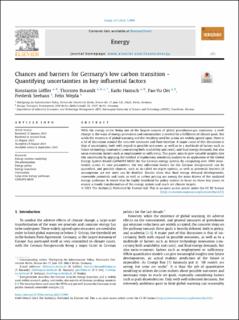| dc.description.abstract | With the energy sector being one of the largest sources of global greenhouse-gas emissions, a swift change in the ways of energy generation and consumption is needed for a fulfilment of climate goals. But while the existence of global warming and the resulting need for action are widely agreed upon, there is a lot of discussion around the concrete measures and their timeline. A major cause of this discussion is that of uncertainty, both with regard to possible outcomes, as well as to a multitude of factors such as future technology innovation (concerning both availability and costs), and final energy demands, but also socio-economic factors such as employment or sufficiency. This paper aims to give valuable insights into this uncertainty by applying the method of exploratory sensitivity analysis to an application of the Global Energy System Model (GENeSYS-MOD) for the German energy system. By computing over 1500 sensitivities across 11 core parameters, the key influential factors for the German Energiewende can be quantified, and possible chances, such as so-called no-regret options, as well as potentials barriers (if assumptions are not met) can be distilled. Results show that final energy demand developments, renewable potentials and costs, as well as carbon pricing are among the main drivers of the analyzed energy pathways. It would thus be highly beneficial for policy makers to focus on these key issues to ensure a timely transformation of the energy system and reach set climate targets. | en_US |

